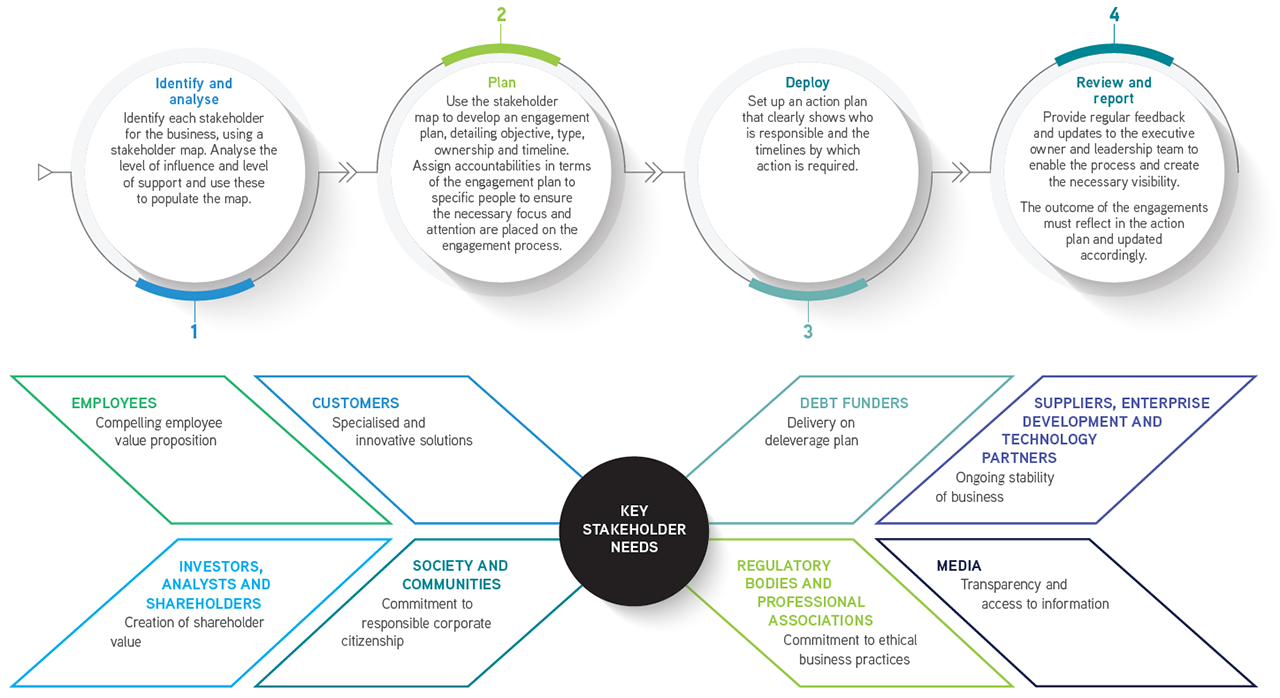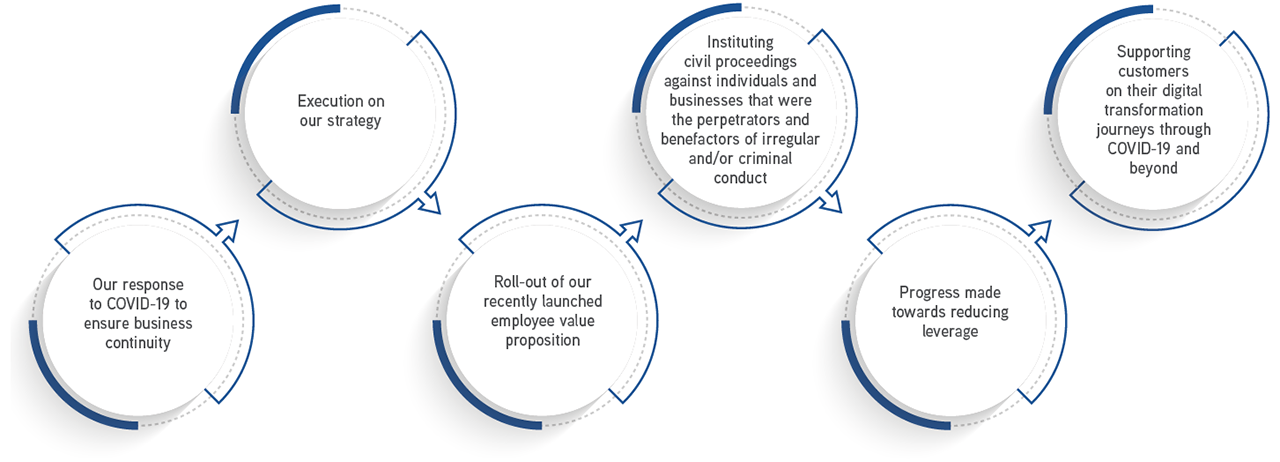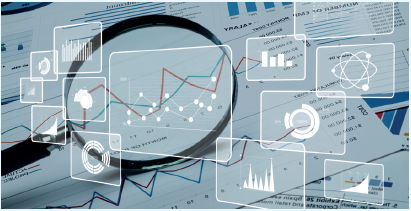engagement
Stakeholder engagement
STAKEHOLDER ENGAGEMENT
EOH is an organisation with a complex value chain and the impact of our operations, products and services extend beyond our employees and customers. Business partners, suppliers, community interest groups, the media and other stakeholder groups have different stakes and expectations related to our business. Improving our understanding of our stakeholders' legitimate needs, interests and expectations provides input into how we approach our business activities, identifies risks and opportunities and helps us to adapt to social, technological and regulatory changes.
We recognise the importance of proactive engagement with our key stakeholders and are committed to robust, consistent and transparent engagement. We define our stakeholders as those groups and individuals that are affected by our actions, whether directly or indirectly, and who affect the activities of the Group.
Stakeholder engagement is one of our five governance objectives, which stem from the Board Charter and Board committee terms of reference and align with the EOH purpose, philosophies and values.
RESPONSIBILITY FOR STAKEHOLDER ENGAGEMENT
Stakeholder engagement in the Group is overseen by the Social and Ethics Committee and material engagements are reported to the Board at each meeting. Interactions with stakeholders take place on both a formal and informal basis, are ongoing and conducted by the functions directly aligned with the stakeholder group. For example, employee engagements are mainly coordinated by the human resources department; the investor relations department oversees engagements with the investment community and engagements with clients include technical and operational staff.
EOH'S APPROACH TO STAKEHOLDER ENGAGEMENT
In the context of sustained value creation for all its stakeholders, EOH's engagement with its stakeholders includes:
An inclusive approach: consultation with stakeholders in developing and achieving an accountable and strategic response to sustainability.
Materiality: determining the relevance and significance of issues to both the Group and its stakeholders. The materiality of issues concerns the legitimate interests and expectations of stakeholders in the context of the legal and strategic considerations of the business.
Responding appropriately to stakeholder issues through decisions, actions and performance, and communication.
Through ongoing and appropriate stakeholder engagements, EOH strives to inform stakeholders, in an appropriate and timely manner, of the implications and impacts of its activities in a fair and transparent manner. Also, to ensure that any disputes are resolved as effectively, efficiency and as expeditiously as possible.
Stakeholder identification
EOH has aligned to the AA1000 Standard, which defines key stakeholders as 'individuals, groups of individuals or organisations that affect and/or could be affected by an organisation's activities, products or services and associated performance, with regard to the issues to be addressed by the engagement.'
EOH must identify its key stakeholders, as well as their interests, level of expertise and degree of influence as this is crucial to successful stakeholder engagement. Identification of EOH's key stakeholders is also important for the efficient allocation of Company resources. The following criteria is used to assess and prioritise stakeholders ('Stakeholder Mapping'):
- Stakeholders' interests.
- Stakeholders' expertise on material issues.
- The level of influence of a particular stakeholder.
- A stakeholder's willingness to engage with the EOH Group.
- Expectations when engaging with the EOH Group.
- Stakeholders' dependence on the EOH Group.
- Value for the EOH Group when engaging with respective stakeholders.
Due to new technologies, regulations and different macro-economic factors, EOH's stakeholders may change from time to time. Stakeholder mapping should therefore be conducted on a regular basis or as and when necessary.
STAKEHOLDER ENGAGEMENT PROCESS

OUR FOCUS FOR THE YEAR AHEAD INCLUDES ONGOING TRANSPARENT COMMUNICATION AND ENGAGEMENT WITH ALL STAKEHOLDERS ON:

SIGNIFICANT ENGAGEMENTS DURING THE YEAR Include
In response to employees’ need for upskilling and reskilling, the Group launched RiseUp Academy – a new approach to learning and development in the digital era, where all staff can access learning wherever they are and from whichever device they choose. Topics include everything from personal development and management, to digitalisation and leadership. In addition, the platform caters to the different ways in which people learn, be it through reading, listening or watching content.

The graduation of enterprise development partners to inclusion in our supplier pool, ensuring economic sustainability, job creation and an increase in the value of black-owned equity in these entities. In addition, surplus office space was made available to the graduate entities giving them presence in all nine provinces with the result of expanding the markets they can service.
In the 2021 financial year, the Group repaid the lenders a further R433 million principally from disposal proceeds resulting in the current total debt balance of c.R2 billion from R4 billion in 2018. The Group has been engaging with lenders to create a more sustainable debt structure and has concluded term sheets with its lenders. We continue to engage with our debt funders on an ongoing basis as part of our deleveraging strategy and focus on liquidity.
At EOH’s annual general meeting on 20 January 2021, 70.65% of shareholders present and eligible to vote, voted in favour of the resolutions representing non-binding endorsement of EOH’s remuneration policy and implementation report. In line with the recommendations of King IV, the Remuneration Committee engaged with shareholders to ascertain the reasons for the dissenting votes and, as discussed in more detail on page 87, the remuneration policy and implementation reports have been amended. While the voting results indicated that there are still shareholder concerns that we need to adequately address in order to achieve the required threshold, this is a significant improvement from only 34.6% who voted in favour of the resolutions in the prior year.
In the wake of the looting and unrest that occurred following the arrest of Former President Jacob Zuma in July 2021, EOH delivered 8 000 cooked meals and 24 tonnes of groceries to EOH staff in areas affected by looting and violence and provided 500 employees with trauma counselling. Further, we partnered with RebuildSA and developed a WhatsApp bot in partnership with Public Display Technologies SA. Through the WhatsApp bot, the growing RebuildSA volunteer base nationally can now be connected with businesses and communities impacted by the recent unrest in real time.

EOH and ENSafrica provided testimony to the judicial inquiry into allegations of state capture (‘the Commission’) in November 2020 (followed by further testimony by ENSafrica in May 2021), related to irregular legacy EOH contracts. The ENSafrica investigation initiated in February 2019 at the EOH Board’s instruction, covered the period from 2015 to 2018. The forensic investigation is now behind the Group, and suspected fraud and corruption has been reported to the authorities and legal proceedings instituted where appropriate.
OUR INTERNAL ASSESSMENT OF THE QUALITY OF OUR RELATIONSHIPS
The section that follows shows EOH’s key stakeholder groups, how we engage with them, their primary concerns during the period and how we address those concerns.
required to improve quality
room for improvement
beneficial relationship
EMPLOYEES
Our employees are critical stakeholders that support the Group's ability to create value by developing and delivering our products and services to our customers.
| Quality of relationship: | Poor | Fair | Strong | |||
Key concerns include:
- Fair remuneration
- Health and safety during COVID-19
- Concern about reputational damage
- Professional and personal development
- Career growth
- Diversity and inclusion
We address these concerns through:
- Enhanced Employee Value Proposition ('EVP') including frameworks and strategies in line with best practice
- Introduction of duvet leave to address rising burnout across the organisation
- Greater transparency on people-related matters
- Launch of RiseUp Academy
- Ongoing assurance of fair remuneration
- Proactive career and performance management
- Using the GetSpace App to allow staff to book office space in a manner that is COVID-19 compliant.
Engagement channels:
- Monthly staff engagements led by the CEO
- Regular HR email communications
- Surveys, polls, consultations
- Employment equity forums
- Intranet
- Diversity and inclusion roundtables
HOW WE DEFINE SUCCESS:
An inclusive and wellness focused culture with an engaged workforce that is proud to be working at EOH and aligned to the Company’s values and purpose.
CUSTOMERS
We sell our technology solutions to customers in a range of industries in the private and public sectors. Strong relationships with customers ensure the profitability and sustainability of our business.
| Quality of relationship: | Poor | Fair | Strong | |||
Key concerns include:
- Concern about reputational issues
- Assurance of ethical service and operations
- Continuity of service delivery
- Ongoing demand for ICT innovation
- Support to work remotely during COVID-19
We address these concerns through:
- Engagement plans to ensure transparent and consistent communications
- Quality assurance and certification programme
- Sales teams maintained client delivery in the new hybrid work delivery context
- Articulation of industry specific solutions
- Implemented a range of innovation initiatives including Solvathons, IP development processes and a digital API marketplace in order to bring ICT innovation to our clients
- Engaging customers on the transition to remote services and other digital solutions during COVID-19
- Extensive marketing, digital marketing and brand awareness activities
- Creating awareness of our contribution to society (eg pandemic, ReliefSA, Solidarity Fund)
- Established remediation helpdesk called duediligence@eoh.co.za that supports our frontline on individual client requests for information and clarity on governance remediation
Engagement channels:
- Personal communication from leadership
- Strategic and key account executives
- Customer engagement forums and events
- Customer service desks and support solutions
HOW WE DEFINE SUCCESS:
Our client franchise success is determined by growth in new clients, growth in penetration of offerings in accounts, the retention of clients and customer satisfaction measurements, which all contribute to revenue growth. In EOH, with the context of our broad array of technology offerings, this is achieved through effective client engagement and coverage of accounts and segments.
DEBT
FUNDERS
Debt funders provide financial capital to fund the Group's activities. Given the high levels of leverage in the Group, the deleverage strategy has been a key focus area as the Group seeks to reduce debt funding to acceptable parameters.
| Quality of relationship: | Poor | Fair | Strong | |||
Key concerns include:
- Ability to deliver on strategy
- Group financial position and performance
- Compliance with commitments under loan agreements
- Complexity and volume of legal requirements
We address these concerns through:
- Ongoing restructuring to leverage value
- Delivery on deleverage strategy
- Transparent financial status reporting
- Independent assurance of future proofing
- Communication of capability building status
Engagement channels:
- All public sources of communication (SENS, website, client and staff comms)
- Monthly reporting forums
- Ad hoc lender meetings
- Facility agent
- Lenders' technical advisor
- Legal counsel engagements
- Bilateral discussions
HOW WE DEFINE SUCCESS:
Establishing an optimal capital structure resulting in materially lower and more manageable financing costs and improved cash flow generation.
SUPPLIERS, ENTERPRISE DEVELOPMENT AND TECHNOLOGY PARTNERS
Suppliers, enterprise development and technology partners support the services and products we supply to our customers and ensuring good relationships with these stakeholders secures our ability to create value.
| Quality of relationship: | Poor | Fair | Strong | |||
Key concerns include:
- Potential reputational impact from partnering with EOH
- Limited black-owned SMME partners for large multi-year contracts
- Achievement of transformation goals under the new ICT sector code
- Disparate implementation of the principles of the procurement policy across businesses
- Cost of procurement transactions and limited supply chain transparency
We address these concerns through:
- Continuous market updates on progress with legacy contracts
- Evidence provided at the Zondo Commission by CEO and ENSafrica
- Creation of ring-fenced black-owned SMME procurement opportunities
- Creating a pool of suitably qualified black-owned SMME partners through ESD initiatives
- Revised preferential procurement framework with targets set at operational levels
- Development and roll-out of digital procurement control framework
- Addition of a digital supplier platform integrated to the ERP with quote and invoice upload functionality and payment query
- Continuous challenge and improvement of procurement processes with a focus on digitisation
Engagement channels:
- Direct interaction with senior executives
- Virtual technology roadshows and conferences
- Intensive ESD engagements
- Public and private sector tenders
HOW WE DEFINE SUCCESS:
Sustainable and strategic partnerships as we establish EOH as a partner of choice and a key technology partner.
INVESTORS, ANALYSTS
AND SHAREHOLDERS
Investors and shareholders provide financial capital in the form of equity to fund the Group's activities and in return they expect a return on their investment. Analysts provide an opinion on the Group's prospects and can influence the attitudes of investors and shareholders towards the Group.
| Quality of relationship: | Poor | Fair | Strong | |||
Key concerns include:
- Resolution of legacy issues
- Deleverage strategy
- Remuneration policy
- Ongoing sustainability of the business post-remediation
- Key man risk
We address these concerns through:
- Regular and transparent updates on the state of our engagements with the relevant law and governmental departments. Any potential liabilities arising from the resolution of the legacy contracts have been provided in the EOH accounts based on legal advice and audited by the external auditor at the end of the 2020 financial year. The Group is satisfied the provisions are adequate based on the advice and facts available.
- The Group has made significant progress in reducing debt from R4bn to R2bn in FY2021 and is in advanced stages in discussions with lenders to put a long-term funding structure in place. Furthermore, progress was made in the disposal of assets that are not aligned to the future growth of the business. The disposal of these assets is key to the deleverage strategy
- Updated and revised remuneration policy following shareholder engagement post-AGM
- Progress in terms of the implementation of cost initiatives, reducing property footprint and the number of legal entities has been well documented and communicated to the investment community across various platforms. The Group has achieved an operating profit and increased margins due to the remediation plans and commercial strategy in place
- Commitment from senior executives to completing the turnaround with KPAs linked to sustainable performance
Engagement channels:
- Email queries
- Investor roadshows and one-on-one meetings
- SENS announcements
- Investor conferences
- Annual general meeting interactions
- Public relations media communications
- Annual integrated report
- Corporate website
HOW WE DEFINE SUCCESS:
It is important for the investment community to understand the EOH business model and growth strategy, which will lead to the market attributing a fair value to the EOH share price.
SOCIETY AND
COMMUNITIES
EOH's investments in socioeconomic development projects promotes development in communities and society and is a fundamental component of our sustainable business strategy. It guides the Group in fostering and maintaining a true transformative culture with respect to B-BBEE, transformation and corporate governance.
| Quality of relationship: | Poor | Fair | Strong | |||
Key concerns include:
- Responsible corporate citizenship
- Commitment to ethical business
- Leadership of digital innovation
- Demand for job opportunities and growth
We address these concerns through:
- EOH sustainability strategy plan
- Internships
- Volunteerism
- Action to develop technology skills in disadvantaged communities
- Contribution to community projects
- Enterprise development programmes
Engagement channels:
- Media releases
- Ongoing engagements with project coordinators
HOW WE DEFINE SUCCESS:
Playing a meaningful role in providing access to the economy, delivering improvement to people's lifestyles through improved education, income, skills development and employment that translate into economic participation.
REGULATORY BODIES AND PROFESSIONAL ASSOCIATIONS
Government regulates business and a poor relationship with regulators can lead to the loss of our licence to operate. Industry bodies such as Business Unity South Africa ('BUSA'), Business Leadership South Africa ('BLSA') and The South African Institute of Chartered Accountants ('SAICA') provide opportunities for the sharing of good practice and provide a unified channel for communicating business's requirements to government.
| Quality of relationship: | Poor | Fair | Strong | |||
Key concerns include:
- The enforcement of the Protection of Personal Information Act ('POPIA') requirements which have come into effect as of July 2021
- Public Procurement Bill/Public Financial Management Amendment Bill
- B-BBEE legislation
- The Companies Amendment Bill
- Occupational Health and Safety Directive
We address these concerns through:
- Organisation-wide POPIA impact assessments to determine compliance with the act. Appointment of Group Information Officer as well as business-specific information officers
- Worker representation on Company Boards. Commentary has been provided on the proposed amendments to BUSA
- Ongoing engagement with lawmakers via professional associations regarding the drafting of new legislation to improve governance and prevent fraud and corruption in the country. We also contributed to the research being conducted on the impact of the current B-BBEE legislation
- Statutory and regulatory compliance
- Collaboration with professional associations
Engagement channels:
- Direct engagements with regulators in accordance with their requirements
- Professional engagements include ad hoc meetings such as task teams, workshops, industry-specific forums, surveys and written feedback on proposals and draft legislation
HOW WE DEFINE SUCCESS:
Ongoing dialogue with regulatory bodies, closing out historic matters of concern, as well as building towards the future. Further collaboration via our memberships with BUSA and BLSA to develop and shape both regulatory and economic policy.
MEDIA
Media coverage of the Group can have a material impact on our reputation and also represents an important information channel for our broader stakeholder base.
| Quality of relationship: | Poor | Fair | Strong | |||
Key concerns include:
- EOH leadership commentary requests
- Zondo Commission
- EOH growth strategy
- New appointments
- Industry conversations where media forms part of the discussion panel
- EOH views on macro-economic issues
- Anti-corruption topics
We address these concerns through:
- Media engagements supported with messaging on EOH social media platforms
- Engagement with media on social media platforms where necessary
- Ensuring we develop proactive and reactive statements for media responses
- Ensuring that EOH leadership is available to engage broadcast media on key issues when required
- Regular engagement with journalists by senior executives across EOH and iOCO to build an understanding of the business and its offerings
- Journalists are updated on strategy and performance through interviews, SENS announcements and press releases. All presentations are loaded on the EOH websites to ensure access to relevant information to all stakeholders
- Shaping public discourse with op-eds and through leadership articles by executives
Engagement channels:
- Interviews
- Media releases
- Editorials
- SENS announcements
- Corporate website
- Social media
- Opinion pieces
HOW WE DEFINE SUCCESS:
Ongoing healthy and transparent engagements with key business and trade media platforms and the related journalists who cover the EOH stories. Ensuring that we continue to provide open engagement with the broader media in terms of responsive and timeous response to media queries and issues as well as providing access to the media for EOH commentary and engagements with EOH leadership and spokespeople around media and business-related issues.
